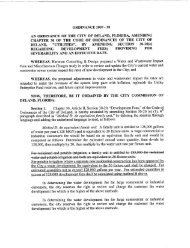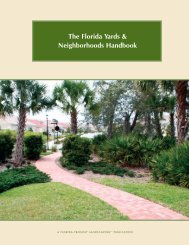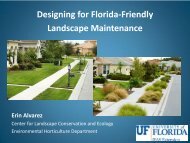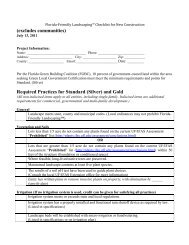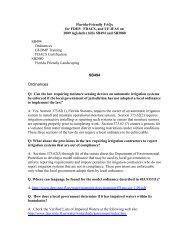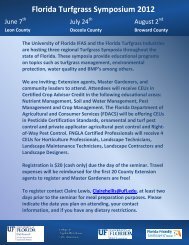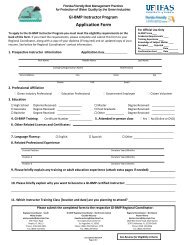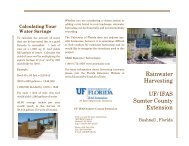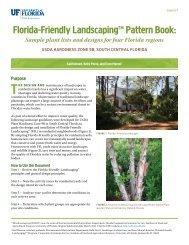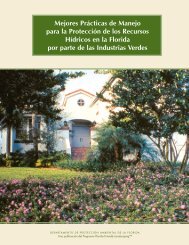A Guide to Florida-Friendly Landscaping A Guide to Florida-Fr ...
A Guide to Florida-Friendly Landscaping A Guide to Florida-Fr ...
A Guide to Florida-Friendly Landscaping A Guide to Florida-Fr ...
Create successful ePaper yourself
Turn your PDF publications into a flip-book with our unique Google optimized e-Paper software.
Soil Know-How<br />
In much of <strong>Florida</strong>, “soil” and “sand” are almost synonymous. The exceptions <strong>to</strong><br />
the sand-soil situation occur in three main locations:<br />
1. In Miami-Dade County the soils are clays; drainage is slow.<br />
2. In the Keys there is really no soil at all — it is rock.<br />
3. In parts of the Panhandle the soil is reddish clay.<br />
For the rest of the state, where the soil is essentially sand, water and nutrients<br />
move downward quickly. As a result, sandy <strong>Florida</strong> soils usually dry out rapidly<br />
and are not compatible with plants having high water and nutritional needs.<br />
Sandy soils are also more likely <strong>to</strong> allow pollutants <strong>to</strong> leach in<strong>to</strong> groundwater<br />
and waterways.<br />
■<br />
Improving soil. The simplest way <strong>to</strong> avoid problems in your landscape is <strong>to</strong><br />
use plants compatible with your site. To grow roses or vegetables, you will<br />
need <strong>to</strong> amend the planting bed frequently by adding organic matter, such<br />
as compost. Organic matter retains moisture, provides nutrients and<br />
attracts beneficial organisms like earthworms. On average — in a typical<br />
<strong>Florida</strong> sandy soil — add organic matter <strong>to</strong> annual flower and vegetable<br />
gardens just before planting.<br />
The easiest way <strong>to</strong> add organic matter <strong>to</strong> a planting bed is <strong>to</strong> put down a<br />
layer 2–3 inches thick, then mix it in<strong>to</strong> the soil using a tiller, a shovel or a<br />
digging fork. In established planting areas, such as a rose bed, add organic<br />
matter as mulch around established plantings each spring, before the rainy<br />
season. Daily rains will help <strong>to</strong> work the material down in<strong>to</strong> the soil. Add<br />
organic matter <strong>to</strong> soil each time you plant a shrub, perennial or annual.<br />
FYN Glossary Box<br />
Mulch: a material on the soil surface <strong>to</strong> conserve soil<br />
moisture, influence soil temperature and control weeds<br />
NRCS Soils Education:<br />
16



